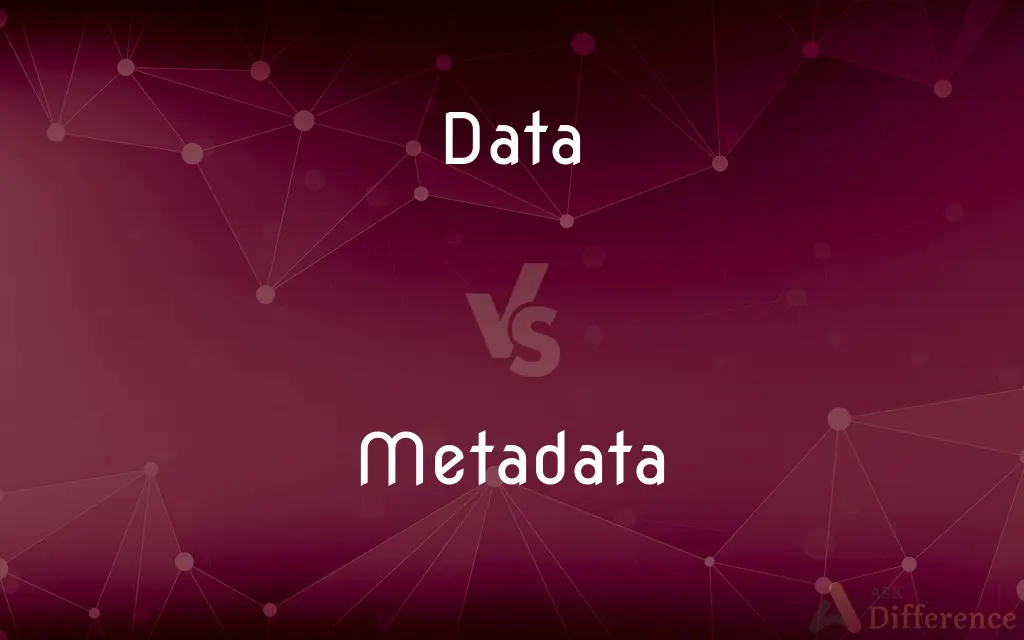Data vs. Metadata — What's the Difference?
By Tayyaba Rehman & Urooj Arif — Published on January 31, 2024
Data is raw information or facts. Metadata is data about data, providing context or additional details about other data.

Difference Between Data and Metadata
Table of Contents
ADVERTISEMENT
Key Differences
Data refers to raw facts and figures without context. It can be numbers, words, measurements, observations, or even just descriptions of things. Metadata, on the other hand, is data that provides information about other data. It's like a descriptor or a guide to understand data better.
In a database, data is the content in the records and fields - such as names, dates, and measurements. Metadata in a database might include the date a record was created, who created it, and file format details.
In research, data is the information collected during the experiment, like survey responses or experimental results. For the same research, metadata could include the methodology of how the data was collected, the instruments used, or the conditions under which data was collected.
In photography, the data is the image itself – the visual content captured in the photograph. In the same context, metadata includes the camera settings, the date the photo was taken, the file size, and the location if available.
In the context of a book, the data is the text – the story, information, or content written on the pages. For a book, metadata would be the publication date, author name, ISBN number, and genre.
ADVERTISEMENT
Comparison Chart
Definition
Raw, unprocessed information
Data providing information about other data
Example
Content of a book, survey responses
ISBN number of a book, date a survey was conducted
Purpose
To convey information or facts directly
To provide context, description, or details about data
Usage
Used to perform analysis or make decisions
Used to organize, find, or understand data
Type
Often variable, can be qualitative or quantitative
Often descriptive, structured information
Compare with Definitions
Data
Information in various forms such as numbers, text, or images.
The satellite transmits data back to Earth.
Metadata
Descriptive data used for identification and discovery.
Metadata tags in the library database make finding books easier.
Data
Detailed records of observations or measurements.
Meteorological data is vital for weather forecasting.
Metadata
Data that provides information about other data.
The metadata of the image file includes the camera model and date taken.
Data
Information collected for reference or analysis.
The data from the survey was crucial for the market analysis.
Metadata
Information that describes characteristics of data.
The document's metadata contains the author's name and creation date.
Data
Raw, unprocessed facts without context.
We gathered extensive data during the experiment.
Metadata
Contextual details about data, like creation date or format.
The photograph's metadata revealed it was edited last week.
Data
Quantitative or qualitative values collected for research.
The clinical trial's data showed promising results.
Metadata
Supplementary data that helps in data management and usage.
Metadata in databases helps in efficient data sorting and retrieval.
Data
Plural of datum
Metadata
Data that describes other data, serving as an informative label.
Most websites contain metadata to tell the computer how to lay out the content on the screen.
Data
Information, especially in a scientific or computational context, or with the implication that it is organized.
The raw information was processed and placed into a database so the data could be accessed more quickly.
Metadata
(computing) Structured information about a file (date created, creator, software used to create, last modified, file format, file fingerprint, etc).
That photo's metadata suggests it was edited using Photoshop.
Data
(collectively) Recorded observations that are usually presented in a structured format.
Metadata
Data about data;
A library catalog is metadata because it describes publications
Data
(computing) A representation of facts or ideas in a formalized manner capable of being communicated or manipulated by some process.
Data
Senseid|en|telephony}}(mobile telephony) {{ellipsis of mobile data: digital information transmitted using the cellular telephone network rather than Wi-Fi.
Run out of data
Data
See Datum.
Data
A collection of facts, observations, or other information related to a particular question or problem; as, the historical data show that the budget deficit is only a small factor in determining interest rates.
Data
Information, most commonly in the form of a series of binary digits, stored on a physical storage medium for manipulation by a computer program. It is contrasted with the program which is a series of instructions used by the central processing unit of a computer to manipulate the data. In some conputers data and execuatble programs are stored in separate locations.
Data
A collection of facts from which conclusions may be drawn;
Statistical data
Common Curiosities
What is metadata?
Metadata is descriptive information that provides context or details about other data.
Is metadata always textual?
Metadata can be textual or numeric, but it is always descriptive and structured.
What is data?
Data is raw, unprocessed information collected for analysis or reference.
What is an example of data?
An example of data is the temperature readings collected over a month.
How important is metadata in digital files?
Metadata is crucial in digital files for organizing, searching, and understanding the contents and properties of the file.
Can data become metadata?
Yes, data can serve as metadata in different contexts. For instance, a document's word count is data that can be metadata for document analysis.
How is metadata used?
Metadata is used to organize, find, understand, and manage data effectively.
Is metadata always visible?
Metadata is not always immediately visible to users; it often requires specific tools or software to view.
Is metadata considered valuable?
Metadata is highly valuable for data management, discovery, and understanding.
Can metadata exist without data?
No, metadata cannot exist without data, as it is essentially information about data.
Do all data systems use metadata?
Most modern data systems utilize metadata to some extent for efficient data management.
What is an example of metadata?
An example of metadata is the file creation date of a digital photograph.
How does metadata help in data analysis?
Metadata provides context and details that make data analysis more accurate and meaningful.
How is metadata created?
Metadata can be created manually by users or automatically by software when data is created or captured.
Can metadata be misleading?
Yes, if metadata is incorrect or outdated, it can lead to misunderstandings or misinterpretation of the data.
Share Your Discovery

Previous Comparison
DDR3 vs. DDR3L
Next Comparison
Rajya Sabha vs. Vidhan SabhaAuthor Spotlight
Written by
Tayyaba RehmanTayyaba Rehman is a distinguished writer, currently serving as a primary contributor to askdifference.com. As a researcher in semantics and etymology, Tayyaba's passion for the complexity of languages and their distinctions has found a perfect home on the platform. Tayyaba delves into the intricacies of language, distinguishing between commonly confused words and phrases, thereby providing clarity for readers worldwide.
Co-written by
Urooj ArifUrooj is a skilled content writer at Ask Difference, known for her exceptional ability to simplify complex topics into engaging and informative content. With a passion for research and a flair for clear, concise writing, she consistently delivers articles that resonate with our diverse audience.














































